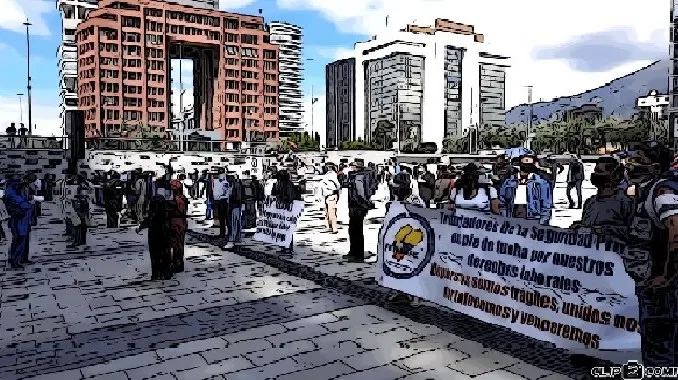
Companies need liquidity to be able to cancel their workers.
Dozens of employees from at least 80 cleaning, custodial, catering, transportation, office supplies, computer equipment, minor construction and medical supplies companies protested at the Financial Platform located in the north center of Quito.
Workers demand payments for goods and services delivered to the State since October 2019. They also reject the Government’s proposal to make payments with State bonds or with Cetes, which are a kind of promissory note.
Trying to maintain social distance and using masks and visors they expressed their discomfort.
Marco Leguízamo, president of the Computer Chamber and representative of the State Provider Platform, assured that the consolidated debt for this group of companies alone is USD 10 million.
He added that in the absence of resources, some companies are laying off personnel and others will close.
He described as mocking the proposal that the Government has given to pay suppliers.
He said that they have consulted the Brokerage Firms and that the answer is that these papers, at this time, are not received.
He explained that if companies were to accept these documents, they would have to wait three years to collect, which is not feasible since they require cash.
Rubén Salvador, president of the National Federation of Private Security Workers of Ecuador (Fenaspe), said that the situation of the security guards is complicated.
He commented that 55% of the 900 security companies provide services to the public sector.
Salvador indicated that the Government would owe this sector USD 40 million and, like Leguízamo, rejected the possibility of paying with bonds, since the companies would not have liquidity to pay their workers.
Meanwhile, the Ministry of Finance insisted on the option of paying with bonds that, according to Deputy Minister Fabián Carrillo, are marketable on the stock market.
The official assured that a possible buyer of said papers could be the bank.
In this regard, the Association of Banks of Ecuador (Asobanca) noted that the regulations say that banks must meet a minimum of 2% on liquidity reserves with bonds and that it is currently complying with it. But it was known that everything will depend on the internal analysis carried out by each bank.


Be the first to comment